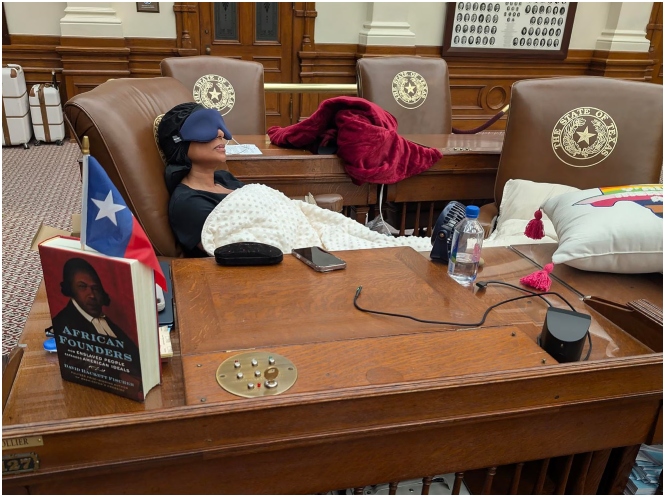Texas State Rep. Nicole Collier, a Fort Worth Democrat and former chair of the Texas Legislative Black Caucus, has filed a habeas corpus petition in state court, alleging she is being subjected to “illegal confinement” inside the state Capitol.
The unusual legal maneuver challenges the extent of legislative authority in enforcing quorum rules and raises constitutional questions about the separation of powers in Texas.
The Conflict at the Capitol

Collier’s petition stems from a standoff with Republican leaders over a GOP-led redistricting plan that could reshape Texas’s congressional map in favor of their party. Democrats, including Collier, had previously left the state in protest to deny Republicans a quorum.
Upon their return, Republicans ordered members to sign what Collier described as a “permission slip,” requiring 24-hour police escorts from the Texas Department of Public Safety.
Collier refused. Instead, she slept on the House floor overnight and filed a habeas petition arguing the directive amounts to unlawful detention.
“If you leave the Capitol, you are subject to arrest,” Rep. Charlie Geren, R-Fort Worth, told Collier, according to her filing. Her attorneys countered that such enforcement has no basis in law when legislators are already present at the Capitol and not absent.
Habeas Corpus and Legislative Arrest Powers
The habeas corpus petition—the centuries-old legal mechanism to challenge unlawful detention—puts front and center the tension between legislative authority and individual rights.
Texas law allows for the civil arrest of absent lawmakers to compel attendance when a quorum is needed. However, Collier’s legal team argues that this authority does not extend to confining legislators who are already present.
“The plain language is clear: a member may be compelled by the Sergeant-at-Arms to attend a legislative session if he or she is physically absent, but no such power is conferred on the Legislature to arrest or otherwise compel a member who is currently present (and not absent) to stay.”
This interpretation highlights a key constitutional distinction: enforcement to secure attendance versus enforcement to prevent departure. If the court agrees with Collier, it could sharply limit how Texas legislative leaders attempt to enforce quorum rules in the future.
Historical Context: Quorum Battles in Texas
Quorum fights are not new in Texas politics. In 2003, Democratic lawmakers fled to Oklahoma and New Mexico in an effort to block redistricting pushed by then-House Majority Leader Tom DeLay. State troopers attempted to track them down, but the lawmakers largely avoided detention.
What makes Collier’s case distinct is her claim of confinement while physically present inside the Capitol. Previous quorum fights involved lawmakers leaving the state entirely, whereas Collier has made herself visible on the House floor. This puts her legal challenge in a unique position: the court must decide whether legislative leaders can restrain a member who has not technically abandoned her duties.
Political Stakes: Redistricting and National Ramifications
The underlying battle concerns mid-decade redistricting—an unusual maneuver intended to solidify Republican control of congressional seats ahead of the 2026 midterm elections. Backed by former President Donald Trump, the plan could shift the balance of power in closely contested U.S. House races.
Democrats argue the effort represents partisan gerrymandering, while Republicans insist they are exercising lawful legislative authority. Meanwhile, blue states like California and New York have floated counter-redistricting plans designed to offset Texas’s political moves.
Thus, the outcome of Collier’s petition carries weight not only in Texas but across the national electoral landscape.
Legal Experts Weigh In
Constitutional scholars say Collier’s case presents an unusual test of habeas law in the legislative context. While habeas petitions typically arise in criminal detention or immigration cases, here it is being used against legislative enforcement.
One legal analyst noted:
- If the court sides with Collier, it would reinforce limits on the Legislature’s power to detain members and affirm that quorum enforcement cannot morph into unconstitutional confinement.
- If the court sides with Republican leaders, it could set a precedent that lawmakers may be restrained at the Capitol against their will—an outcome critics warn would have a chilling effect on legislative dissent.
What’s Next
The Texas House is set to reconvene Wednesday morning at 10 a.m., with Republicans expected to move forward on their redistricting plan. Collier’s petition seeks an immediate injunction against any attempts to detain her and could force the court to rule swiftly.
For now, Rep. Nicole Collier has become a symbol of resistance, vowing not to “go along quietly” with what she calls intimidation. Her overnight protest, bonnet and sleep mask included, underscores the extraordinary lengths to which this legal and political fight has escalated.

